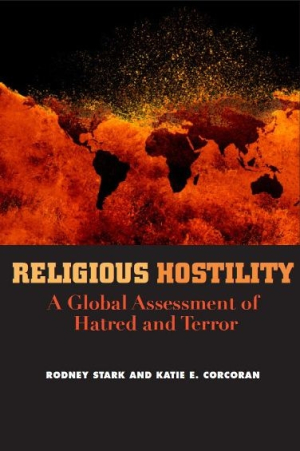It looks like you've stumbled upon a page meant to be read by our code instead of viewed directly. You're probably looking for this page.
Religious Hostility
A Global Assessment of Hatred and Terror
Delving into global data, these authors offer insight into methods of reducing religious conflict throughout the world.
Religious Hostility: A Global Assessment of Hatred and Terror, by Rodney Stark and Katie E. Corcoran, is a fascinating but flawed monograph on global religious tensions. The cover design depicting Earth engulfed by an inferno perfectly sets the tone for the book’s controversial topics.
The authors provide historical context of religious practices and conflicts, and they review studies conducted by the Pew Research Center, the International Social Survey Program, and the Gallup Organization, as well as presenting results of their own analysis of religious atrocities occurring worldwide during 2012. Both authors have strong credentials. Stark is a distinguished professor of social sciences and codirector of the Institute for Studies of Religion at Baylor University. Corcoran is a post-doctoral fellow at the Baylor Institute for Studies of Religion.
The authors assert that, in its extreme form, religious particularism—commitment to the belief that “there is only one true faith”—can lead to hostilities spurred by uncivil dicta, such as this one from Saudi Arabia: “Be dissociated from the infidels, hate them for their religion … always oppose them in every way according to Islamic law.” In this light, the authors conclude that “any attempt to reduce religious hostilities by revealing them to be based on false, negative beliefs would be absurd, and increased contact might well result in increased hostility.” Instead, Stark and Corcoran argue for replication of the American example of religious civility, although they acknowledge that the American experiment may not be exportable.
The authors’ goal of imposing “the discipline of real data on discussions of worldwide religious hostility” is admirable, but implementation of that goal is only partially successful. Nowhere do the authors explain whether the results they report are statistically significant as opposed to merely suggestive or, worse yet, spurious. Also, textual citations are insufficient. The book contains nearly forty tables of valuable information, but specific sources are too often omitted.
Stronger editing could have corrected these problems; it could also have removed passive voice, indefinite pronouns, double negatives, and confusing sentences, such as, “Although each of these faiths believes there is but one true God, none has been unable to sustain one true faith.”
Nonetheless, Religious Hostility provides thought-provoking grist for substantive discussions about religious hostility and civility.
Reviewed by
Nancy Walker
Disclosure: This article is not an endorsement, but a review. The publisher of this book provided free copies of the book to have their book reviewed by a professional reviewer. No fee was paid by the publisher for this review. Foreword Reviews only recommends books that we love. Foreword Magazine, Inc. is disclosing this in accordance with the Federal Trade Commission’s 16 CFR, Part 255.
